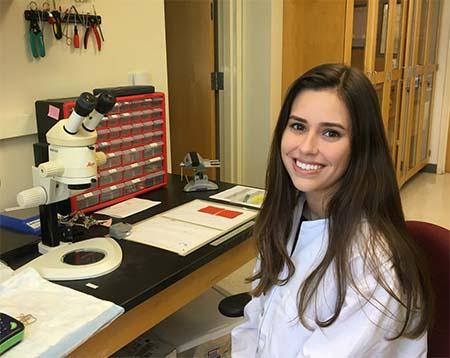
Neuroscience Student Researches Anxiety-Alcoholism Connection
When senior Malia Belnap ‘20 arrived at Santa Clara University as a transfer student in 2016, she was registered as a biology and psychology double major. Always fascinated by the inner workings of the human brain, she had hoped that the two programs would prepare her for future work in the biotech field. However, her true passion was not two separate studies, but instead a blend of the two: neuroscience.
Fortunately for Belnap and other SCU students, SCU’s College of Arts and Sciences launched its new neuroscience major in 2017, and Belnap was one of the first to join. Already providing her abundant opportunities, the neuroscience major has allowed Belnap to embark upon a two-year internship as research assistant in SCU Professor Lindsay Halladay’s lab, which focuses on neural circuits, systems, and behavior.
A few months ago, Belnap joined Dr. Halladay and a small group of students to study how neural circuitry adapts and changes in response to stress, and how that stress correlates with alcohol consumption. Belnap spends several hours each day in the lab performing behavioral assays and studying the comorbidity of anxiety disorders and addiction, a research topic she finds “extremely significant to our society” because “it is such a common pairing. It is easy to infer that there is a biological link between anxiety and alcoholism.” Moreover, by having improved insight into the specific neural circuits involved in anxiety-related drinking behaviors, scientists can strive to develop better treatments and therapies for patients who suffer from both afflictions.
Administered through the College of Arts and Sciences REAL Program, Belnap’s internship is supported by a DeNardo Grant, which awarded her $15,000 for academic-year and summer research support over two years. She notes that her experience in the neuroscience program has been “unbelievable” and that the ability to study something so meaningful as a paid research assistant is more than she ever could have hoped.
--
About the REAL Program
The College of Arts and Sciences developed the REAL Program to allow students to discover their interests, gain a rich understanding of a particular field, discern their career goals, and explore future employment fields. We believe financial means should not determine whether or not a student can participate in internships, research, or creative works opportunities. Committed to providing paid experiential learning opportunities for students, the REAL program provides stipends up to $5,000 for undergraduate opportunities lasting up to 10 weeks over the summer. In 2018, its first year, the REAL Program distributed $550,000 to over 125 students.
For more information about the REAL Program, please visitwww.scu.edu/REALor contact Daniel Iritani, Director of External Relations for the College of Arts and Sciences at DIritani@scu.edu.